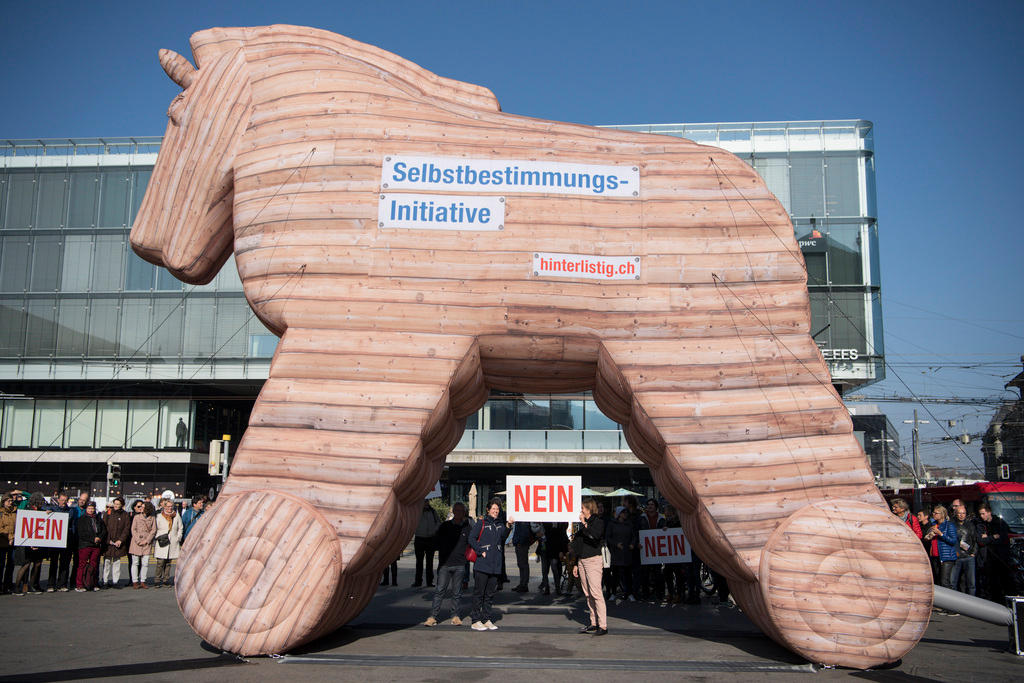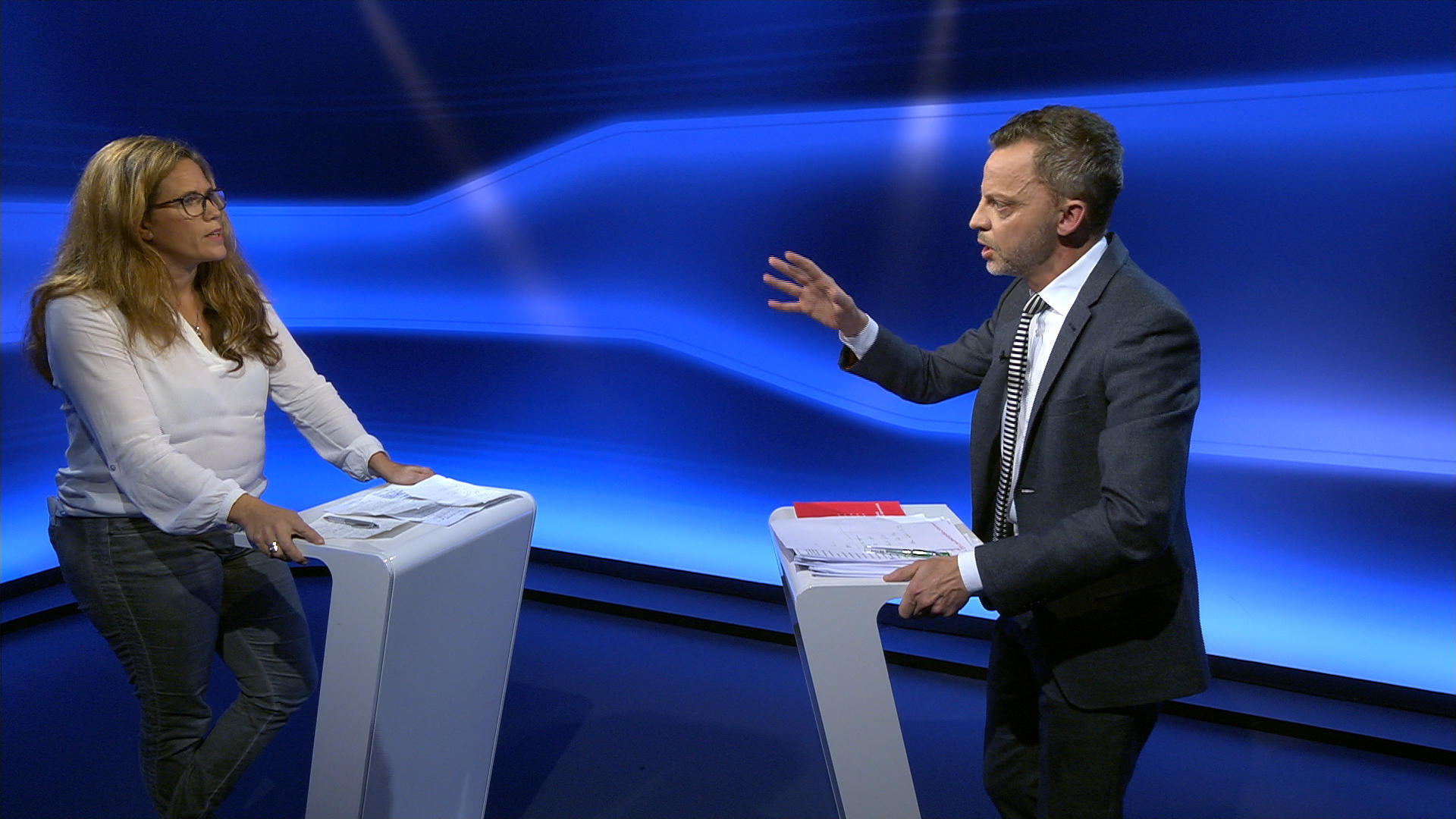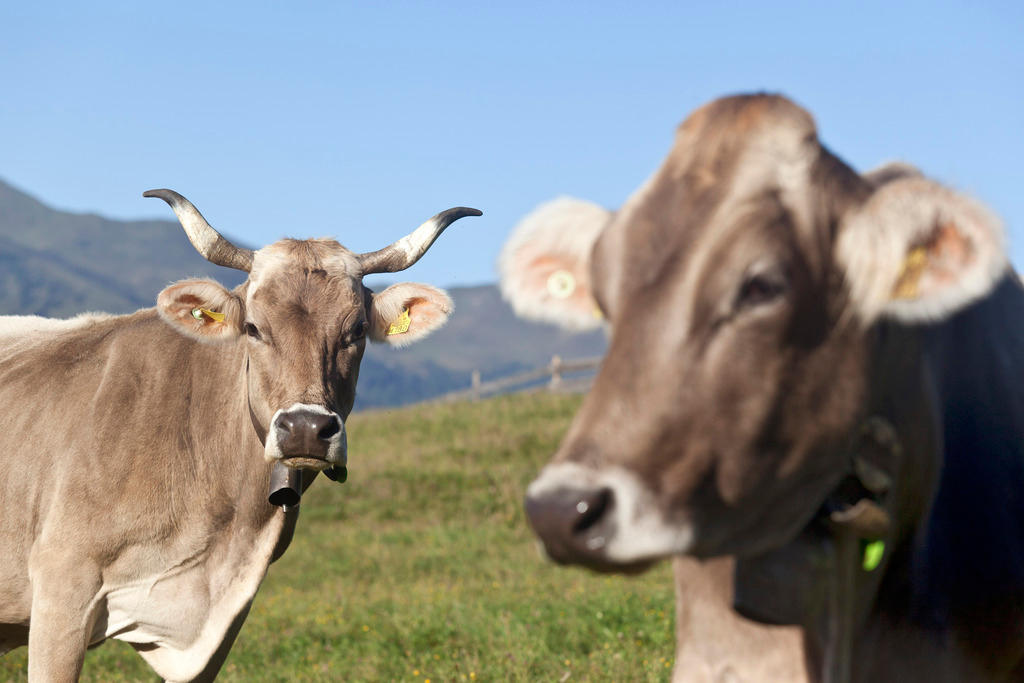Support for ‘Swiss law first’ initiative remains limited
A rightwing proposal to put Swiss law above international law has failed to win additional support over the past few weeks. Pollsters expect the initiative will be rejected in a nationwide vote later this month.
In its latest survey published on Wednesday, the leading GfS Bern research and polling instituteExternal link found opponents widened their margin over supporters of the conservative right People’s Party proposal by 9% (from 16% to 24%) early this month.
Along with the ‘Swiss law first’ initiative, two other proposals will be put to a vote on November 25: One proposal is to pay subsidies to farmers who keep cows and goats with horns. The other is to adopt a law with the aim of cracking down on social insurance fraudsters and setting the legal basis for social welfare detectives.
See graphic below for the polling results on the three issues.
“It appears the arguments of the ‘Swiss law first’ initiative committee have not convinced many citizens outside the ranks of the People’s Party,” says GfS Bern political scientist Martina Mousson. She points out that opinions were made at an early stage of the campaign.
The political debates kicked off in September, pitting the People’s Party against a broad alliance of parties from the centre-right to the left, trade unions, parliament and the government as well as civil society.
Respondents in the poll, notes Mousson, did not rate direct democracy as a political decision-making method more important than Switzerland’s reputation as an international trading partner respecting international treaties.
Opposition against the rightwing initiative has increased in all three language regions and all other political parties – except for the People’s Party supporters, government critics and individuals without a clear party affiliation.
Lukas Golder, director of the institute, adds that the People’s Party did not succeed in whipping up emotions and reaching out to a broader audience.
“The tone and the visual display of the debate was somewhat unexpectedly moderate compared with previous initiatives by the Swiss People’s Party and the issue at stake,” says Golder.
The findings are in apparent contradiction to reports of heated panel discussions across the country and multi-million spending for the campaigns as well as broad media coverage over the past few weeks.
Pollsters interviewed 3,683 Swiss citizens from all language regions across the country for the final of two nationwide surveys.
The survey is based on online responses as well as telephone interviews, both with fixed line and mobile phone users, and was carried out from October 31 to November 7.
The margin of error is 2.7%.
The poll was commissioned by the Swiss Broadcasting Corporation (SBC), swissinfo.ch’s parent company, and carried out by the leading GfS Bern research institute.
After the defeat at the polls in 2016 of its hardline proposal to expel criminal foreigners, the party opted for a more moderate policy approach hoping to appeal to centrist voters.
Golder says the initiative is likely to be defeated. But the effort marks a turning point for the party which, he says, is shifting away from populism to neo-conservative policies with a view to next year’s parliamentary elections.
Neck-and neck
Pollsters are more cautious in their predictions on the outcome of the vote on the cow horn initiative. It has also lost support across the board, but the result could be close.
Supporters currently have a lead of 3% over opponents; 5% of poll respondents said they were still undecided.
Experts don’t rule out an upset at the ballot box if the opponents fail to get across their arguments in the coming days.
The initiative still has a majority among Green Party and People’s Party grassroots who agree with animal welfare arguments, according to the survey. Opposition has grown compared with a previous poll from the beginning of October.
“With the exception of the economics minister, Johann Schneider-Ammann, opponents have kept a low profile until now,” notes Mousson.
The initiative committee is led by a mountain farmer and has the support from private individuals, animal protection groups, environmentalists, adherents of anthroposophy as well as esoteric organisations.
Overshadowed
The third issue to come to a vote, a parliamentary decision to grant private detectives more powers for covert investigations into suspected insurance fraudsters, seems to be set for approval.
Political scientist Golder says the group challenging the law to a referendum could not get across their message.
Despite their flying start with their online campaign and support among the younger generation, the referendum committee looks set to be heading for a clear defeat.
“The concerns about the private sphere of citizens were not accepted as a decisive factor to reject the law,” says Golder. He notes that the referendum committee may only be able to win majorities in some parts of French-speaking Switzerland.
It didn’t help that the issue of social welfare detectives has remained overshadowed by the two initiatives, he argues.
Overall voter turnout on November 25 is expected at around 46% – in line with the average rate recorded over the past six years. Turnout in the three previous nationwide votes held earlier this year varied between 33.8% and 54.4%.

In compliance with the JTI standards
More: SWI swissinfo.ch certified by the Journalism Trust Initiative







You can find an overview of ongoing debates with our journalists here. Please join us!
If you want to start a conversation about a topic raised in this article or want to report factual errors, email us at english@swissinfo.ch.